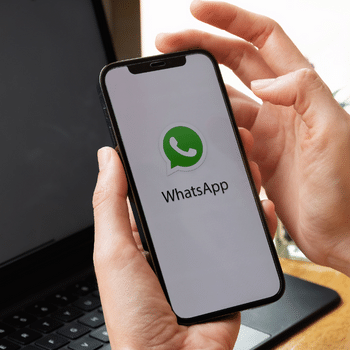WhatsApp: how to safely use the messaging app
 No one can argue against the statistics: WhatsApp is the most popular instant messaging app in the world. According to an analysis by Statista, the services ended the month of April with approximately 2.44 billion active users.
No one can argue against the statistics: WhatsApp is the most popular instant messaging app in the world. According to an analysis by Statista, the services ended the month of April with approximately 2.44 billion active users.
And there are plenty of reasons why. It was the first app of its type to become widely available on mobile devices. It’s easy to use, with a friendly interface and entertaining resources. You likely use it, too, whether to chat with family and friends, or even your colleagues at work. With the recent launch of WhatsApp Business, usually used by companies wanting to employ the platform as a customer service tool, the fame of the application continues to increase.
But do you know how to use WhatsApp safely? Despite many Internet users ignoring this fact, the truth is that the platform features loads of functionalities that can be used to add extra layers of protection to your account, preventing profile theft and increasing your degree of privacy. They are simple settings, though they can make all the difference in the daily routine of someone concerned about remaining safe in an online environment. We have set aside a few crucial tips for you.
Native WhatsApp resources
As mentioned, despite being ignored by many users, WhatsApp does feature a series of functionalities that allow you to use the app more safely. Below is a list of appropriate measures you can adopt:
-
Two-factor authentication (2FA): this is practically a must. By enabling this resource, you’ll need to enter a PIN if you install WhatsApp on another device. This makes it harder to steal your account. If you forget the PIN, you can recover it using a reliable e-mail address.
-
Screen lock: nowadays, almost all smartphones feature a fingerprint sensor. WhatsApp allows you to use this type of biometric recognition to open the application. This prevents unauthorized people from snooping through your messages, even if they get hold of your unlocked phone.
-
Disappearing messages: this is a resource that can be set as a standard (for all new chats) or on-demand (enabled for a specific chat). With disappearing messages, the chat record is automatically deleted for both parties within a specific period – 90 days, 7 days or 24 hours.
-
Privacy: do you want to prevent your contact from seeing the last time you were online? Do you want only your friends to see your profile photo? Do you want to avoid being added to random groups? Would you prefer to hide your status from certain contacts? All of these can be set according to four options: ‘Everyone’, ‘Nobody’, ‘My contacts’ and ‘My contacts except...’ In the last option, you decide who can view your content.
Details that make a difference
These protective measures may seem somewhat trite, but they are crucial to guarantee your privacy on the web. Remember: luckily, we’re living at a time when Internet users have (or at least should have) complete control of their personal or sensitive information and data.
Furthermore, some of the resources cited here (like two-step verification or screen locking) could make all the difference in preventing your account from being hijacked. These are functionalities that make the life of malicious actors all the more challenging, deterring possible cyberattacks. If you use WhatsApp as part of your daily routine, it’s worth noting these tips and adding extra layers of security to your account.
